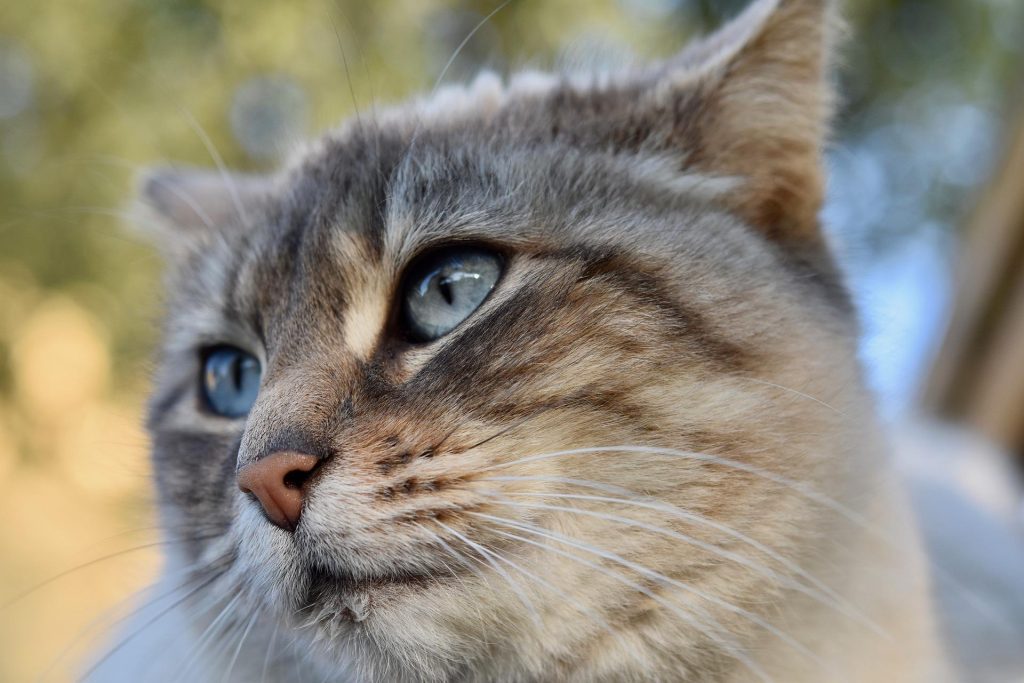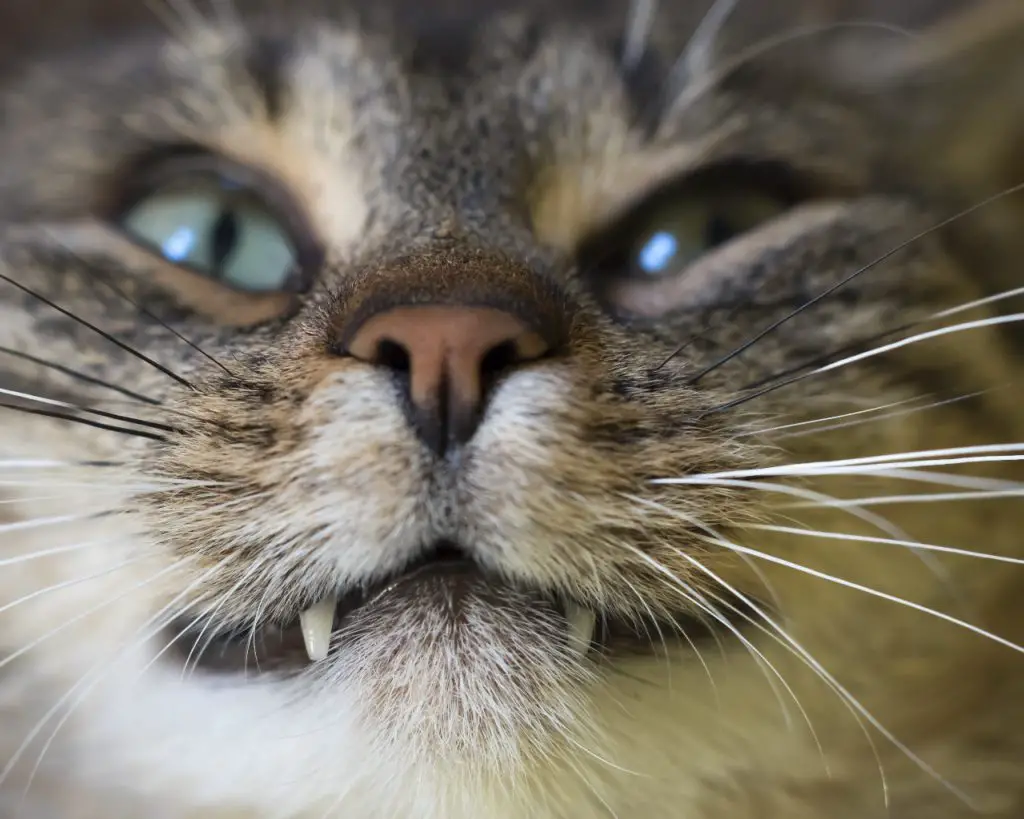If you’ve ever wondered whether your cat’s congestion is serious or not, you’re not alone. Many pet owners find themselves in this situation, and it can be difficult to know what to do. So, if your cat sounds congested but has no discharge, read on.
In this blog post, we will discuss the symptoms of cat congestion and when you should take your pet to the veterinarian. We will also provide some tips for helping your cat recover from this illness.
- What Is Feline Rhinitis
- What Causes Feline Rhinitis
- Cat Sounds Congested But No Discharge? What To Do
- How Do You Decongest a Cat?
- Why Does My Cat Sound Like He Has Mucus In His Throat?
- Risks Associated With Feline Rhinitis
- Symptoms of Feline Rhinitis
- How a Vet Will Diagnose Feline Rhinitis
- Can Cats Get Nasal Congestion?
- Can Cats Have Post Nasal Drip?
- In Conclusion
Key Takeaway
- A cat may sound congested but have no discharge due to causes like allergies, a common cold, a foreign object in the airways, or more serious health conditions such as tumors or parasites.
- Feline rhinitis is a medical condition in cats characterized by inflammation of the nasal passages, leading to symptoms like sneezing, nasal discharge, and congestion.
- Feline Rhinitis, an inflammation of the cat’s nasal passages, is typically caused by viral, bacterial, or fungal infections, but can also be due to allergies, exposure to environmental irritants, or more serious conditions such as cancer or polyps.
What Is Feline Rhinitis
Feline rhinitis is an infection of the nose and upper respiratory tract in cats. It can affect both the nasal cavity and sinuses, leading to sneezing, coughing, runny eyes and nose, congestion, and mouth breathing.
The infection is usually caused by a virus or bacteria such as Bordetella bronchiseptica or Mycoplasma species.
Chronic rhinitis can be managed with medications to reduce inflammation and antibiotics to treat secondary bacterial infections.
Additionally, supportive care such as humidifiers and steam baths can help alleviate symptoms.
Cat Sounds Congested But No Discharge
What Causes Feline Rhinitis
- Viral infections. Feline rhinitis is often caused by a virus such as feline herpesvirus (FHV) or feline calicivirus (FCV). These viruses can cause inflammation of the nose and upper respiratory tract, leading to sneezing, coughing, runny eyes and nose, congestion, and mouth breathing.
- Bacterial infections. Bacteria such as Bordetella bronchiseptica or Mycoplasma species can also cause feline rhinitis. Symptoms of bacterial infection include difficulty breathing, nasal discharge, sneezing, and stertor (a snoring sound).
- Allergens. Allergens in the environment can trigger an allergic reaction in cats that can lead to inflammation of the nasal passages and the development of feline rhinitis.
- Trauma. Physical trauma to the head or nose can also cause inflammation leading to feline rhinitis.
Cat Sounds Congested But No Discharge?

A cat may sound congested but have no discharge due to reasons such as allergies, a common cold, a foreign object in the airways, or more serious health issues like tumors or parasites.
Allergies
Allergies can cause a cat to sound congested. This could be due to an allergic reaction to something in the environment, such as dust, pollen, or certain foods.
The allergic reaction can cause inflammation in the nasal passages, leading to a congested sound. Antihistamines or other allergy medications, prescribed by a vet, can help alleviate these symptoms.
Common Cold
Just like humans, cats can catch a common cold which can cause them to sound congested. This is usually not a serious condition and should clear up on its own in a few days. However, if the congestion persists, it is advisable to seek veterinary care to rule out more serious conditions.
Foreign Object in Airways
A foreign object lodged in a cat’s airways can cause it to sound congested. This could be anything from a piece of food to a small toy. If you suspect that your cat has inhaled or swallowed a foreign object, it is important to seek immediate veterinary care.
Serious Health Issues
More serious health issues, such as tumors or parasites, can also cause a cat to sound congested. These conditions are more serious and require immediate attention from a vet. Regular check-ups can help detect these issues early and ensure your cat gets the treatment it needs.
Cat Sounds Congested But No Discharge
How Do You Decongest a Cat?

To decongest a cat, you can utilize various methods such as providing a humid environment, using a saline nose drop, or giving vet-prescribed medication.
Provide a Humid Environment
Creating a humid environment can help to alleviate your cat’s congestion. You can do this by running a humidifier in the room where your cat spends most of its time.
Alternatively, allowing your cat to stay in a steam-filled bathroom for a brief period can also help to clear its nasal passages.
Use Saline Nose Drops
Saline nose drops can be used to help relieve your cat’s congestion. These can be purchased from a pet store or made at home using non-iodized salt and warm water.
Always ensure to use them in moderation and under the guidance of a vet.
Vet-prescribed Medication
In some cases, over-the-counter medications or vet-prescribed drugs may be necessary to decongest your cat.
These could include antihistamines, antibiotics, or other types of medication depending on the underlying cause of the congestion. It’s essential to always consult with a vet before administering any medication to your cat.
Cat Sounds Congested But No Discharge
Why Does My Cat Sound Like He Has Mucus In His Throat?

Mucus buildup in the throat of cats is often the result of an infection, such as a cold or flu. However, it can also be caused by allergies, environmental irritants, or a foreign object lodged in the throat. In some cases, mucus production may be increased due to a medical condition, such as laryngitis or gastroesophageal reflux disease (GERD).
However, the most common reason why cats sound like they have mucus in their throat is because of an upper respiratory infection. Upper respiratory infection in cats is a condition that can be caused by several different viruses or bacteria. The most common cause of upper respiratory infection in cats is the feline herpes virus, which is also known as the rhinotracheitis virus.
This virus is highly contagious and can spread through contact with infected cats, or through exposure to their secretions. This is a fairly common condition in cats and can cause a number of symptoms including congestion, sneezing, and runny eyes.
Other viruses that can cause upper respiratory infection in cats include the feline calicivirus and the feline immunodeficiency virus. Bacterial infections that can cause upper respiratory infections in cats include Bordetella bronchiseptica, Chlamydophila felis, and Mycoplasma felis. If your cat is displaying any of these symptoms, go to the vet.
Another possibility is that your cat may be suffering from allergies. Allergies are becoming increasingly common in cats, and can often manifest as respiratory problems. The most common allergen is pollen. It is very easy to actually determine if your cat is allergic. If the coughing only starts in the summer months and ends when summer passes, it is most definitely an allergy to pollen.
Cat Sounds Congested But No Discharge
Risks Associated With Feline Rhinitis
Feline rhinitis can cause a variety of complications and risks for cats. Here are the most common risks associated with this condition:
- Inflammation and swelling of nasal passages. Rhinitis can lead to inflammation and swelling of the nasal passages, making it difficult for cats to breathe properly.
- Breathing difficulties. As the condition progresses, cats may experience labored breathing or even difficulty breathing in some cases.
- Decreased appetite. Rhinitis may cause cats to feel uncomfortable when eating due to blocked nasal passages, leading to decreased appetite.
- More serious respiratory conditions. If left untreated, rhinitis can progress into more serious respiratory conditions such as pneumonia or even death.
- Compromised immune system. Pets with compromised immune systems may be at an increased risk of developing infections due to rhinitis.
Symptoms of Feline Rhinitis
Feline Rhinitis is a common respiratory condition in cats that can cause a variety of symptoms. Here are the most common symptoms of feline rhinitis:
- Pawing at the face. Cats may paw at their face as an attempt to relieve the discomfort caused by rhinitis.
- Nasal discharge. Rhinitis can cause a runny nose, which may be clear or yellowish in color.
- Sneezing. Sneezing is one of the most common signs of rhinitis in cats and can be very frequent in some cases.
- Loss of appetite. Cats with rhinitis may not feel like eating due to the discomfort they experience when breathing through their nose.
- Decreased airflow. Rhinitis can cause inflammation and swelling in the nasal passages, leading to difficulty breathing through the nose.
- Breathing through the mouth. When cats cannot breathe through their nose, they will often resort to breathing through their mouth instead.
- Labored breathing. In severe cases, cats may have labored breathing due to inflammation and swelling in their nasal passages caused by rhinitis.
Cat Sounds Congested But No Discharge
How a Vet Will Diagnose Feline Rhinitis
Feline rhinitis is a common condition that can be difficult to diagnose. Here are the steps a vet will take to diagnose this condition:
- Take a history and physical examination. The vet will ask questions about the cat’s symptoms and examine them for signs of infection or inflammation.
- X-rays, CT scans, and rhinoscopy. These imaging tests can help the vet determine if there is any structural damage to the nasal passages or sinuses.
- Nasal biopsy. This procedure involves taking a sample of tissue from the nose to look for signs of infection or inflammation.
- Blood tests. These tests can help rule out other conditions such as allergies or infections that may be causing the symptoms.
- Skin testing. This test can help identify allergies that may be contributing to the problem.
- Treatment trial. If all other tests come back negative, the vet may recommend trying different treatments to see if they improve your cat’s symptoms.
By following these steps, your vet can accurately diagnose feline rhinitis and provide effective treatment options for your pet!
Can Cats Get Nasal Congestion?
Yes, cats can get nasal congestion. However, it is not as common as it is in dogs. Nasal congestion in cats is usually caused by a viral infection, such as the common cold, or by an allergy. If your cat has nasal congestion, you may notice them sneezing more than usual, and it may have a runny nose. Some cats with nasal congestion may also have a fever.
Nasal congestion occurs when the tissues lining the inside of the nose become inflamed and swollen. This can be caused by a number of things, including allergies, infections, and even certain medications. When these tissues swell, they block off the nasal passages and make it difficult for air to flow through.
This can cause your cat to experience a stuffy nose, runny eyes, and difficulty breathing. In some cases, nasal congestion can even lead to life-threatening respiratory problems. If you notice your cat displaying any of these symptoms, it’s important to take them to see a veterinarian right away.
Fortunately, there are a number of home remedies that can help to relieve your cat’s nasal congestion. One of the most effective is steam therapy. Simply set up a humidifier in your cat’s room and let it run for several hours each day. You can also place a bowl of warm water in the room, which will help to increase the humidity levels even further.
Another helpful remedy is to give your cat a small amount of honey. Honey has natural antibacterial and anti-inflammatory properties, which can help to soothe your cat’s congestion. You can add a teaspoon of honey to your cat’s food or water bowl, or you can drizzle it directly onto their tongue.
If your cat’s congestion is severe, you may also want to consider using a saline nasal spray. These sprays help to loosen mucus and make it easier for your cat to breathe. Be sure to use a saline spray designed specifically for cats, as human versions can be too harsh for their delicate noses.
Can Cats Have Post Nasal Drip?
Yes, cats can have post-nasal drip. However, it is important to note that this is not a medical condition in and of itself. Rather, it is a symptom that can be caused by a number of different underlying conditions.
Post-nasal drip is a condition that can affect cats of all ages. It occurs when mucus accumulates in the nose and throat, causing your cat to have a runny nose. Post-nasal drip can be caused by allergies, upper respiratory infections, or even just a cold.
If your cat is suffering from post-nasal drip, you may notice them sneezing more than usual, or having trouble breathing through their nose. They may also have a wet cough, or gagging and retching as they try to clear their throat.
In order to determine whether or not your cat has a post-nasal drip, it is important to consult with your veterinarian. They will be able to perform the necessary tests and examinations to rule out any other potential causes.
If your cat does indeed have post-nasal drip, there are a few things you can do to help alleviate its symptoms. These include:
- Keeping their nose clear by wiping away any discharge that may accumulate
- Using a humidifier in their environment to help keep the air moist
- Giving them regular baths to help hydrate their skin and coat
FAQs
Q: What are the common symptoms of a congested cat?
A: A congested cat may exhibit symptoms such as difficulty breathing, sneezing, coughing, wheezing, nasal congestion, watery eyes, and reduced appetite. If you notice any of these symptoms, it is important to seek veterinary care for your cat.
Q: Can allergies cause my cat to sound congested?
A: Yes, allergies can cause nasal congestion in cats. Just like humans, cats can have allergic reactions to various substances such as pollen, dust mites, or certain foods. If your cat is experiencing congestion due to allergies, your veterinarian may recommend allergy testing and prescribe medication or suggest environmental changes to help alleviate the symptoms.
Q: How can I help my congested cat breathe better?
A: There are a few things you can do to help your congested cat breathe better. You can try using a humidifier to moisten the air, keeping your cat’s environment dust-free, and ensuring they have access to plenty of fresh water. However, it is crucial to consult a veterinarian to determine the underlying cause and receive appropriate treatment.
Q: Should I be concerned if my cat sounds congested but has no other symptoms?
A: While it is always best to consult a veterinarian when your cat sounds congested, it may not always be a cause for immediate concern if there are no other symptoms present. However, if the congestion persists or worsens, or your cat’s overall health deteriorates, it is important to seek veterinary advice to rule out any underlying issues.
Q: Can I use over-the-counter cold medications for my congested cat?
A: No, it is not recommended to use over-the-counter cold medications or any human medications for cats without veterinary guidance. Cats have different metabolic and physiological processes than humans, and certain medications can be toxic to them. Always consult a veterinarian who can recommend safe and effective treatments for your congested cat.
Q: Is there a way to prevent my cat from getting congested?
A: While it may not be possible to prevent all cases of congestion in cats, there are a few steps you can take to minimize the risk. Keeping your cat’s environment clean, free from dust and allergens, ensuring good ventilation, and providing a balanced diet with proper hydration can help support your cat’s immune system and reduce the chances of congestion.
Q: How long will it take for my cat to recover from congestion?
A: The recovery time for a congested cat depends on the underlying cause and the severity of the condition. In mild cases, with appropriate treatment, cats can start to feel better within a few days. However, in more severe cases or chronic conditions, it may take weeks or even longer for complete recovery. Your veterinarian can provide a better estimate based on your cat’s specific situation.
Q: When should I take my congested cat to the veterinarian?
A: It is recommended to take your congested cat to the veterinarian if the symptoms persist for more than a few days, worsen over time, or if your cat shows signs of distress such as difficulty breathing or reduced appetite. Early veterinary intervention can help diagnose and treat the underlying cause effectively.
In Conclusion
Feline rhinitis is a serious condition that can cause a variety of complications and risks for cats. Inflammation, breathing difficulties, decreased appetite, and even more, serious conditions can occur if it is left untreated.
Pets with compromised immune systems may also be at an increased risk of developing infections.
It is important to seek prompt medical attention from your vet if you suspect your pet may be suffering from this condition in order to avoid any potential complications or risks.




